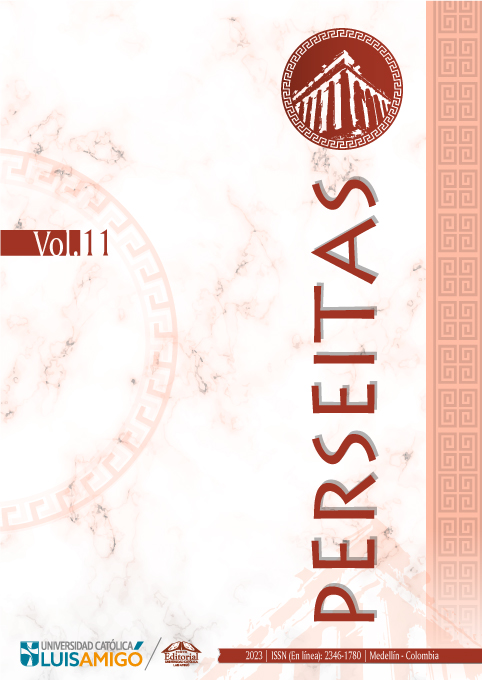The Undocile Body of the Leviathan. Notes on Democracy in Thomas Hobbes
DOI:
https://doi.org/10.21501/23461780.4461Keywords:
Undocile body, Democracy, Frontispiece, Leviathan, Potentiae, PotestasAbstract
The conceptual distinctions proposed by Thomas Hobbes reflect the political problem of considering the multiple in unity or the convergence of innumerable bodies, desires and passions in the consolidation of a unitary sovereign will. Examples of this are the notions of potentiae (potencies) and potestas (power), together with others such as multitude and people or subjects and sovereign. All of them reflect the problem of the stability of the State and its institutional legitimacy: the need to generate, in a continuous way, a common power. To formulate a democratic reading, the purpose of this paper is to relate an iconographic reading of the frontispiece of the Leviathan to the presence/absence of an indomitable body. The paper concludes that an essential feature of Hobbesian political theory is the sense of the democratic based on the inescapable presence of collective bodies that must be represented.
Downloads
References
Agamben, G. (2017). Stasis. La guerra civil como paradigma político. Homo sacer II (F. Costa & I. Costa, Trads.). Adriana Hidalgo editora. (Obra original publicada en 2003)
Brandt, R. (1982). Das Titelblatt des Leviathan und Goyas El Gigante [El frontispicio del Leviatán y El gigante de Goya]. En U. Bernmbach & K-M. Kodalle (Eds.), Furcht und Freiheit. LEVIATHAN- Diskussion 300 Jahrenach Thomas Hobbes (pp. 203-231). Westdeutscher Verlag. https://doi.org/10.1007/978-3-322-94334-7
Bredekamp, H. (2003). Stratégies visuelles de Thomas Hobbes: Le Léviathan, archétype de l’État moderne: Illustrations des oeuvres et portraits [Estrategias visuales de Thomas Hobbes: El Leviatán, arquetipo del Estado moderno: Ilustraciones de obras y retratos]. Éditions de la Maison des sciences de l’homme.
Bredekamp, H. (2007). Thomas Hobbes’s Visual Strategies [Estrategias visuales de Thomas Hobbes]. In P. Springborg (Ed.), The Cambridge companion to Hobbes’s Leviathan [El libro de Cambridge sobre el Leviatán de Hobbes] (pp. 29-60). Cambridge University Press. https://doi.org/10.1017/CCOL0521836670.002
Brito Vieira, M. (2009). The Elements of Representation in Hobbes: Aesthetics, Theatre, Law, and Theology in the Construction of Hobbes’s Theory of the State [Los elementos de representación en Hobbes: Estética, Teatro, Derecho y Teología en la Construcción de la Teoría del Estado de Hobbes]. Brill.
Cardoso dos Santos, A. G. (2021, dezembro). O dilema da escolástica: A crítica hobbesiana à teoria escolástica e à fundamentação do poder papal no frontispício do Leviatã [El dilema de la escolástica: la crítica hobbesiana de la teoría escolástica y la justificación del poder papal en el frontispicio del Leviatán] [Ponencia]. VII Congresso Internacional Hobbes.
Champion, J. (2010). Decoding the Leviathan: Doing the History of Ideas through Images, 1651-1714 [Descodificar el Leviatán: La historia de las ideas a través de las imágenes, 1651-1714]. En M. Hunter (Ed.), Printed Images in Early Modern Britain: Essays in Interpretation [Las imágenes impresas en la Gran Bretaña de principios de la Edad Moderna: ensayos de interpretación] (pp. 255-275). Ashgate Publishing Limited.
Fernández Peychaux, D. A. (2018a). El materialismo de Hobbes. Prolegómenos para una figuración americana de la soberanía. Araucaria: Revista Iberoamericana de Filosofía, Política, Humanidades, 20(39), 535-557. https://institucional.us.es/revistas/Araucaria/39_2018/Fernandez%20Peychaux.pdf
Fernández Peychaux, D. A. (2018b). The Multitude in the Mirror: Hobbes on Power, Rhetoric, and Materialism [La multitud en el espejo: Hobbes sobre el poder, la retórica y el materialismo]. Theory & Event, 21(3), 652-672.
Fernández Peychaux, D. A. (2018c). Un campanario que sostenga el cielo. En C. Abdo Férez, D. Fernández Peychaux & G. Rodríguez Rial (Comps.), Hobbes, el hereje: teología, política y materialismo (pp. 37-60). Eudeba.
Fernández Peychaux, D. A., & Mattei Pawliw, E. (2023). Niccolò Machiavelli and Thomas Hobbes: resistance between desires and movement [Nicolás Maquiavelo y Thomas Hobbes: resistencia entre deseos y movimiento]. ESSAIS Revue interdisciplinaire d’ Humanités, 19, 1-20. https://doi.org/10.4000/essais.12341
Field, S. (2014). Hobbes and the Question of Power [Hobbes y la cuestión del poder]. Journal of the History of Philosophy, 52(1), 61-85. https://doi.org/10.1353/hph.2014.0010
Field, S. (2020). Potentia: Hobbes and Spinoza on Power and Popular Politics [Potentia: Hobbes y Spinoza sobre el poder y la política popular]. Oxford University Press.
Frost, S. (2008). Lessons from a Materialist Thinker: Hobbesian Reflections on Ethics and Politics [Lecciones de un pensador materialista: Reflexiones hobbesianas sobre ética y política]. Stanford University Press.
Frost, S. (2016). El miedo y la ilusión de la autonomía (J. A. Fernández Manzano & G. Castel de Lucas, Trads.). Las Torres de Lucca. Revista Internacional de Filosofía Política, 5(9), 175-200. https://revistas.ucm.es/index.php/LTDL/article/view/76989 (Obra original publicada en 2010)
Ginzburg, C. (2018). Miedo, reverencia, terror: cinco ensayos de iconografía política (C. Aguirre Rojas, Trad.). Prohistoria Ediciones & Contrahistorias. (Obra original publicada en 2015)
González García, J. M. (1998). Metáforas del poder. Alianza Editorial.
Hobbes, T. (1840). The Answer of Mr. Hobbes to Sir William Davenant’s Preface before “Gondibert” [Respuesta de Thomas Hobbes al Prefacio del poema Gondibert de Sir William Davenant]. En S. W. Molesworth Barth (Ed.), The English Works of Thomas Hobbes of Malmesbury (pp. 442-460). (Obra original publicada en 1651)
Hobbes, T. (1928). The Elements of Law, Natural and Politic [Los elementos del derecho natural y político] (F. Tönnies, Ed.). Cambridge The University Press. (Obra original publicada en 1640)
Hobbes, T. (1973). Critique du De mundo de Thomas White [Reseña de la obra De mundo, de Thomas White] (J. Jacquot & H. W. Jones, Eds.). Librairie Philosophique J. Vrin.
Hobbes, T. (2019). Leviatán (C. Balzi, Trad.). Colihue Clásica. (Obra original publicada en 1651)
Hobbes, T. (1993). El ciudadano (J. Rodríguez Feo, Ed.). C.S.I.C y Debate. (Obra original publicada en 1642)
Jakonen, M. (2013). Multitude in Motion: Re-readings on the Political Philosophy of Thomas Hobbes [Multitud en movimiento: relecturas de la filosofía política de Thomas Hobbes] [Disertación doctoral, University of Jyväskylä]. Jyväskylän yliopiston julkaisuarkisto. https://jyx.jyu.fi/bitstream/handle/123456789/41204/978-951-39-5164-1_vaitos27042013.pdf?sequence=1
Kristiansson, M., & Tralau, J. (2013). Hobbes’s hidden monster: A new interpretation of the frontispiece of Leviathan [El monstruo oculto de Hobbes: Una nueva interpretación del frontispicio del Leviatán]. European Journal of Political Theory, 13(3). https://doi.org/10.1177/1474885113491954
Limongi, M. I. (2009). O homem excêntrico: paixões e virtudes em Thomas Hobbes [El hombre excéntrico: pasiones y virtudes en Thomas Hobbes]. Edições Loyola.
Limongi, M. I. (2013). Potentia e potestas no Leviathan de Hobbes [Potentia y potestas en el Leviatán de Hobbes]. DoisPontos:, 10(1), 143-166. http://dx.doi.org/10.5380/dp.v10i1.32128
Lloyd, S. A. (2009). Morality in the Philosophy of Thomas Hobbes: Cases in the Law of Nature [La moral en la filosofía de Thomas Hobbes: Casos de Derecho de la Naturaleza]. Cambridge University Press.
Malcolm, N. (2002). Aspects of Hobbes [Aspectos de Hobbes]. Oxford University Press.
Martel, J. (2007). Subverting the Leviathan: Reading Thomas Hobbes as a Radical Democrat [Subvertir el Leviatán: La lectura de Thomas Hobbes como demócrata radical]. Columbia University Press.
Matheron, A. (1997). The Theoretical Function of Democracy in Spinoza and Hobbes [La función teórica de la democracia en Spinoza y Hobbes]. En W. Montag & T. Stolze (Eds.), The New Spinoza (Theory Out of Bounds) [El nuevo Spinoza (Teoría fuera de los límites)] (pp. 207-218). University of Minnesota PressMontag. https://www.mirovni-institut.si/wp-content/uploads/2017/04/Warren_Montag_Ted_Stolze_The_New_Spinoza_Theory_Out_Of_Bounds.pdf
Pitkin, H. (1967). The Concept of Representation [El concepto de representación]. University of California Press.
Ramírez Beltrán, J. A. (2021). Thomas Hobbes y el liberalismo político: una lectura sobre la noción de felicidad. Ápeiron. Estudios de filosofía, (14), 17-48.
Ramírez Beltrán, J. A. (2022a). Imagen y democracia en Thomas Hobbes: Anotaciones sobre la teoría de la representación. En M. P. de Büren, S. Fernández Bouzo, E. Mattei Pawliw & F. Ramírez Llorens (Comps.), Tiempos dislocados: investigadores en formación y producción en la era prepandémica (pp. 25-54). Consejo Latinoamericano de Ciencias Sociales–CLACSO. http://repositorio.sociales.uba.ar/items/show/3269?download=3206
Ramírez Beltrán, J. A. (2022b). Efectos políticos de un alma material. Pasiones y razón en Isabel de Bohemia. Bajo Palabra, (29), 79-100. https://doi.org/10.15366/bp2022.29.004
Rosales, M. (2014). El par conceptual pueblo-multitud en la teoría política de Thomas Hobbes. Universidad del Rosario.
Rosales, M. (2020) Spinoza y Hobbes. Entre retórica y necroscopia. Ragif Ediciones.
Schmitt, C. (1990). El Leviathan en la teoría del Estado de Tomás Hobbes (J. Conde, Trad.). Editorial Struhart & Cía. (Obra original publicada en 1938)
Springborg, P. (1995). Hobbes’s biblical beasts: Leviathan and Behemoth [Las bestias bíblicas de Hobbes: Leviatán y Behemoth]. Political Theory, 23(2), 353-375.
Sreedhar, S. (2010). Hobbes on Resistance: Defying the Leviathan [Hobbes sobre la Resistencia: Desafiar al Leviatán]. Cambridge University Press.
Skinner, Q. (1996). Reason and Rhetoric in the Philosophy of Hobbes [Razón y retórica en la filosofía de Hobbes]. Cambridge University Press.
Skinner, Q. (2010). Hobbes y la libertad republicana (J. Udi, Trad.). Universidad de Quilmes y Editorial Prometeo. (Obra original publicada en 2008)
Skinner, Q. (2018). From Humanism to Hobbes: Studies in Rhetoric and Politics [Del humanismo a Hobbes: Estudios de Retórica y Política]. Cambridge University Press.
Strauss, L. (2014). Derecho natural e historia (L. Nosseto, Trad.). Prometeo Libros. (Obra original publicada en 1953)
Tralau, J. (2014). Deception, politics and aesthetics: The importance of Hobbes’s concept of metaphor [Engaño, política y estética: La importancia del concepto de metáfora de Hobbes]. Contemporary Political Theory, 13 (2), 112-129.
Tuck, R. (2006). Hobbes and Democracy [Hobbes y la democracia]. En A. Brett, J. Tully, & H. Hamilton-Bleakley (Eds.), Rethinking the Foundations of Modern Political Thought [Repensar los fundamentos del pensamiento político moderno] (pp. 171-191). Cambridge University Press.
Tuck, R. (2016). The Sleeping Sovereign: The Invention of Modern Democracy [El soberano dormido: la invención de la democracia moderna]. Cambridge University Press.
Published
How to Cite
Issue
Section
License

This work is licensed under a Creative Commons Attribution-NonCommercial-NoDerivatives 4.0 International License.
La revista y los textos individuales que en esta se divulgan están protegidos por las leyes de copyright y por los términos y condiciones de la Licencia Creative Commons Atribución-No Comercial-Sin Derivar 4.0 Internacional.
















